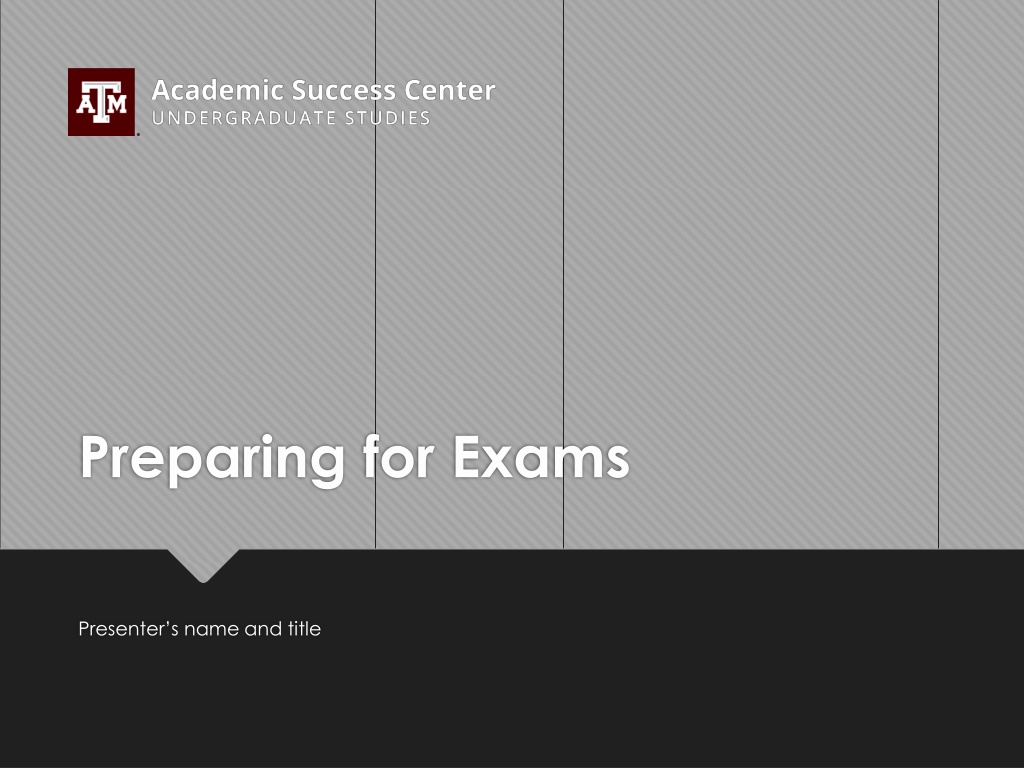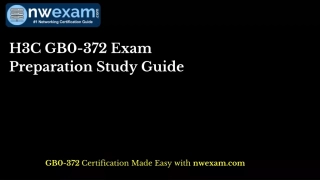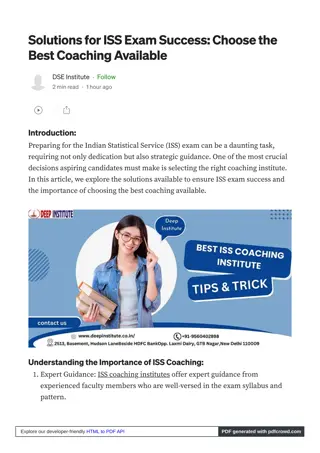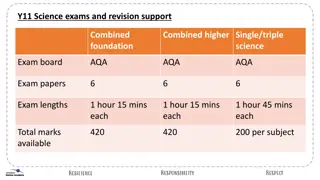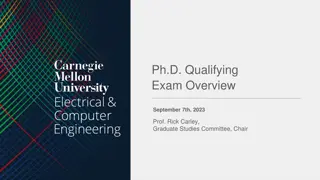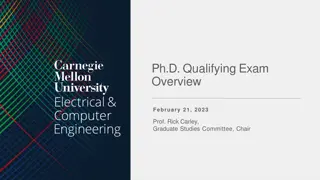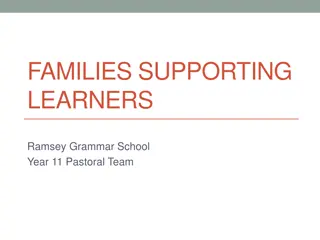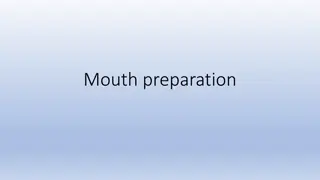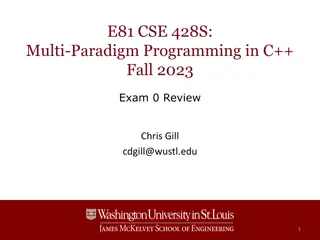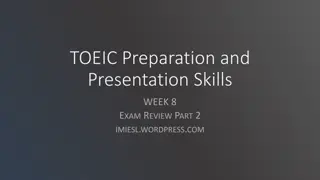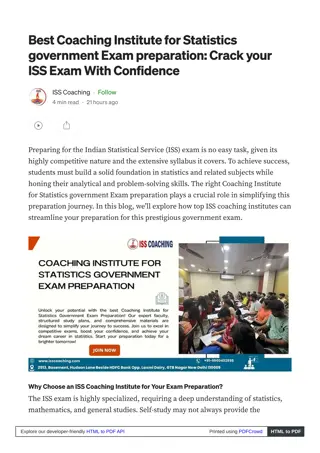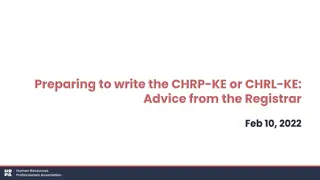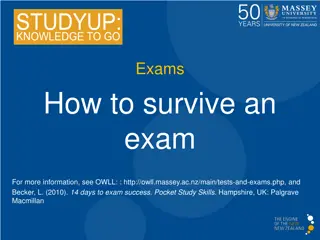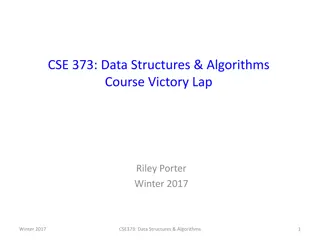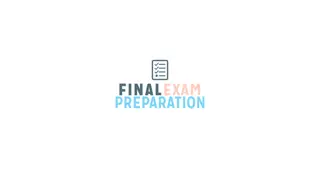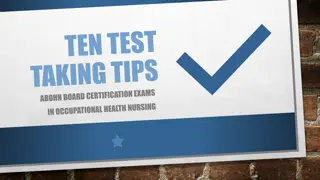Effective Exam Preparation Strategies: A Comprehensive Guide
Explore effective exam preparation strategies including information processing, active learning techniques, study plans, and methods to avoid forgetting what you learn. Understand the importance of following a consistent approach to learning, actively engaging with study materials, and making use of test preparation materials. The guide emphasizes the significance of avoiding cramming, developing study plans, and utilizing various methods to enhance learning efficiency and retention.
Uploaded on Sep 26, 2024 | 0 Views
Download Presentation

Please find below an Image/Link to download the presentation.
The content on the website is provided AS IS for your information and personal use only. It may not be sold, licensed, or shared on other websites without obtaining consent from the author. Download presentation by click this link. If you encounter any issues during the download, it is possible that the publisher has removed the file from their server.
E N D
Presentation Transcript
Preparing for Exams Presenter s name and title
Overview Information Processing Why Cramming Doesn t Work A Better Approach to Learning Exam-Prep Strategies 5-Day Study Plan Studying for More Than One Exam at a Time Post-Test Analysis
How Our Brains Process Information See Taste Hear Touch Smell
Follow a Consistent Approach to Learning Learning is a process. Adopt the process and avoid cramming! Prepare before class Focus in class Take good notes Review/Practice/Study after class
Avoid Forgetting What You Learn Preview before class Review after
Study Actively Reviewing helps avoid the forgetting curve, but studying should consist of more than just review Look at the course learning outcomes and study for the level of learning at which you re expected to perform Convert your notes into test prep materials that help you learn at the intended levels Study with purpose each study session
Active Learning/Test Prep Materials Develop study sheets Outline Develop concept maps Summarize material Make flashcards (word, question, formula, problem) Chart related material List steps in the process (timeline) Do study guides Predict/plan/write essay questions and answers Create a hierarchy or flowchart or Venn diagram Answer questions at the end of the chapter Make and define a list of 20, 30, 40 topics that would be on the exam Prepare material for study group Do problems (w/o looking up steps)
Make a Study Plan The TAMU Academic Success Center recommends making a five-day study plan (these need not be consecutive days). Plan out your schedule and amount of time to study (days and hours) Divide material covered on the exam into four segments Start with the oldest information first Proceed by systematically studying and reviewing Employ Specific Make/Use strategies Self-test
5-Day Study Plan Day 1 Day 4 Prepare/Make 4th chunk, 1 hrs Prepare/Make 1st chunk, 2 hrs Review/Use 3rd chunk, 30 mins Day 2 Review/Use 2nd chunk, 20 mins Prepare/Make 2nd chunk, 2 hrs Review/Use 1st chunk, 10 mins Review/Use 1st chunk, 30 mins Day 5 Review/Use 4th chunk, 30 mins Day 3 Review/Use 3rd chunk, 20 mins Prepare/Make 3rd chunk, 1 hrs Review/Use 2nd chunk, 10 mins Review/Use 2nd chunk, 30 mins Review/Use 1st chunk, 10 mins Review/Use 1st chunk, 15 mins SELF-TEST, 1 hour
Multiple Exams at Once Sun Mon Tues POLS Day 3 Wed POLS Day 4 Thurs POLS Day 5 Fri Sat Sun Mon Tues One Test POLS Day 1 POLS Day 2 POLS Exam Sun Mon POLS Day 2 Tues POLS Day 3 Wed POLS Day 4 Thurs POLS Day 5 Fri Sat Sun Mon Tues POLS Day 1 POLS Exam Two Tests MATH Day 1 MATH Day 2 MATH Day 3 MATH Day 4 MATH Day 5 MATH Day 6 MATH EXAM Sun Mon Tues Wed Thurs Fri Sat Sun Mon Tues Three Tests, Four POLS Day 1 POLS Day 2 POLS Day 3 POLS Day 4 POLS Day 5 POLS Exam MATH Day 1 MATH Day 2 MATH Day 3 MATH Day 4 MATH Day 5 MATH Day 6 MATH EXAM PSYC Day 1 PSYC Day 2 PSYC Day 3 PSYC Day 4 PSYC Day 5 PSYC EXAM CHEM Day1 CHEM Day 2 CHEM Day 3 CHEM Day 4 CHEM Day 5 CHEM Day 6 CHEM Day 7 CHEM EXAM
Minimize Test Anxiety Before the exam: Establish a good study routine throughout the semester, so you don t have to pack all your learning into the days before an exam. Know the logistical info on exam day. What do you need to bring? Where do you go? What time? Get plenty of sleep the night before, eat well, and give yourself plenty of time so you don t have to rush. Avoid outside stress. Avoid others who are anxious. During the exam: Survey the test before you try to answer any questions. Remind yourself to relax and use relaxation strategies. Avoid doubt by answering questions you know first. Don t linger too long on questions you don t know Focus on your test; don t worry about what others are doing
After the Exam Engage in a Post-Test Analysis. Figure out what active strategies of learning worked and those that did not. You must have access to your exam to perform a meaningful Post-Test Analysis. (Note: If you do not get the exam back, then go to office hours to review the questions. Even if your exam is returned to you, it is still wise to go to office hours to discuss the exam with your professor.)
Post-Test Analysis Some questions to ask yourself (and possibly the professor) Where did the questions come from Book? Lecture? Did I spend enough time studying? When did I start? Did I CRAM or spread it out? What types of questions did I miss? Is there a pattern to it? Did I make careless errors Marked the wrong bubble? Misread the question? How can I change my approach (i.e. learning strategies) to the material in order to do better next time?
Goal of Post-Test Analysis Each exam should be considered a learning opportunity for you to determine what adjustments need to be made for future Exam Preparation. The underlying concepts of Post-Test Analysis can easily be applied to papers, projects, and presentations. Incorporate feedback provided to know what changes to make in the future. (Again If no feedback is spontaneously provided, go to office hours to talk to your professor about the assignment and any recommendations for the future.)
